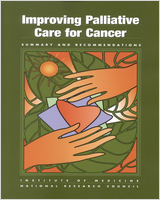NCBI Bookshelf. A service of the National Library of Medicine, National Institutes of Health.
Institute of Medicine (US) and National Research Council (US) National Cancer Policy Board; Foley KM, Gelband H, editors. Improving Palliative Care for Cancer: Summary and Recommendations. Washington (DC): National Academies Press (US); 2001.

Improving Palliative Care for Cancer: Summary and Recommendations.
Show details1. Enhance Key Elements of the Data System Infrastructure
Recommendation 1: Develop a core set of cancer care quality measures.
The Secretary of the Department of Health and Human Services (DHHS) should designate a committee made up of representatives of public institutions (e.g., the DHHS Quality of Cancer Care Committee, state cancer registries, academic institutions) and private groups (e.g., consumer organizations, professional associations, purchasers, health insurers and plans) to: 1) identify a single core set of quality measures that span the full spectrum of an individual's care and are based on the best available evidence; 2) advise other national groups (e.g., National Committee for Quality Assurance, Joint Commission for the Accreditation of Healthcare Organizations, Quality Forum) to adopt the recommended core set of measures; and 3) monitor the progress of ongoing efforts to improve standard reporting of cancer stage and comorbidity.
- a)
Research sponsors (e.g., Agency for Healthcare Research and Quality [AHRQ], National Cancer Institute [NCI], Health Care Financing Administration [HCFA], Department of Veterans Affairs [VA]) should invest in studies to identify evidence-based quality indicators across the continuum of cancer care.
- b)
Ongoing efforts to standardize reporting of cancer stage and comorbidity should receive a high priority and be fully supported.
- c)
Efforts to identify quality of cancer care measures should be coordinated with ongoing national efforts regarding quality of care.
Recommendation 2: Congress should increase support to the Centers for Disease Control and Prevention (CDC) for the National Program of Cancer Registries (NPCR) to improve the capacity of states to achieve complete coverage and timely reporting of incident cancer cases. NPCR's primary purpose is cancer surveillance, but NPCR, together with the Surveillance, Epidemiology, and End Results (SEER) Program, has great potential to facilitate national, population-based assessments of the quality of cancer care through linkage studies and by serving as a sample frame for special studies.
Recommendation 3: Private cancer-related organizations should join the American Cancer Society and the American College of Surgeons to provide financial support for the National Cancer Data Base. Expanded support would facilitate efforts underway to report quality benchmarks and performance data to institutions providing cancer care.
Recommendation 4: Federal research agencies (e.g., NCI, CDC, AHRQ, HCFA) should support research and demonstration projects to identify new mechanisms to organize and finance the collection of data for cancer care quality studies. Current data systems tend to be hospital based, while cancer care is shifting to outpatient settings. New models are needed to capture entire episodes of care, irrespective of the setting of care.
Recommendation 5: Federal research agencies (e.g., National Institutes of Health [NIH], Food and Drug Administration [FDA], CDC, and VA) should support public-private partnerships to develop technologies, including computer-based patient record systems and intranet-based communication systems, that will improve the availability, quality, and timeliness of clinical data relevant to assessing quality of cancer care.
Recommendation 6: Federal research agencies (e.g., NCI, AHRQ, VA) should expand support for training in health services research and training of professionals with expertise in the measurement of quality of care and the implementation and evaluation of interventions designed to improve the quality of care.
2. Expand Support for Analyses of Quality of Cancer Care Using Existing Data Systems
Recommendation 7: Federal research agencies (e.g., NCI, AHRQ, VA) should expand support for health services research, especially studies based on the linkage of cancer registry to administrative data and special studies of cases sampled from cancer registries. Resources should also be made available through NPCR and SEER to provide technical assistance to states to help them expand the capability of using cancer registry data for quality improvement initiatives. NPCR should also be supported in its efforts to consolidate state data and link them to national data files.
Recommendation 8: Federal research agencies (e.g., NCI, AHRQ, HCFA) should develop models for the conduct of linkage studies and the release of confidential data for research purposes that protect the confidentiality and privacy of healthcare information.
3. Monitor the Effectiveness of Data Systems to Promote Quality Improvement Within Health Systems.
Recommendation 9: Federal research agencies (e.g., NCI, AHRQ, HCFA, VA) should fund demonstration projects to assess the application of quality monitoring programs within healthcare systems and the impact of data-driven changes in the delivery of services on the quality of health care. Findings from the demonstrations should be disseminated widely to consumers, payers, purchasers, and cancer care providers.
- Recommendations from Enhancing Data Systems to Improve the Quality of Cancer Car...Recommendations from Enhancing Data Systems to Improve the Quality of Cancer Care (IOM, 2000) - Improving Palliative Care for Cancer
Your browsing activity is empty.
Activity recording is turned off.
See more...